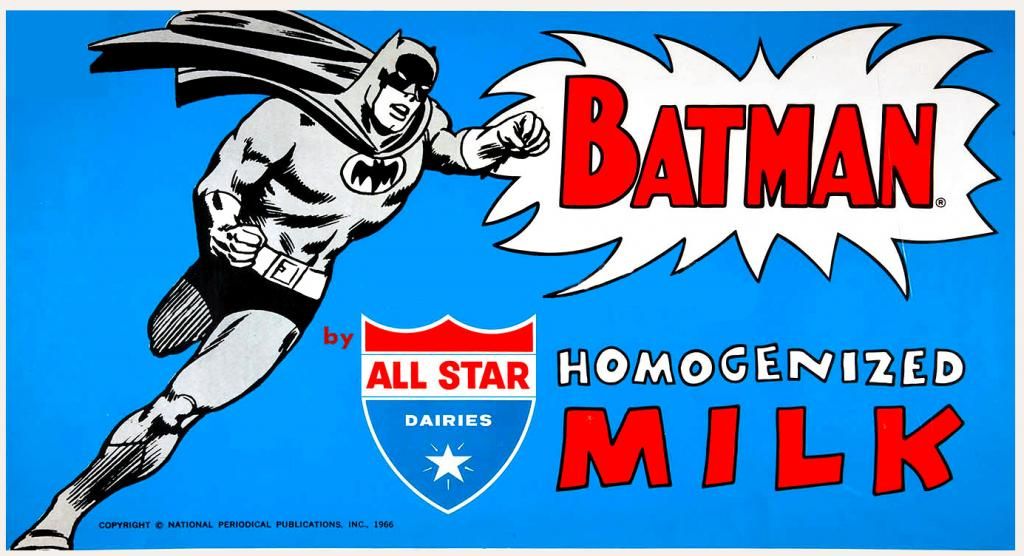At its peak in February 1966, BATMAN reportedly reached about 14 million households or 42% of the total viewing audience. The first sign of a drop in the ratings occurred as early as March 1966 when the Wednesday episodes began to get lower ratings and barely made the weekly top twenty in the Nielsen ratings.
By summer, the show had dropped even further. In a syndicated August 11, 1966 Associated Press article, Cynthia Lowry wrote: “The series, which caused more talk than any other recent TV product, suffered a sharp decline in the early summer ratings. It dropped out of the list of top-rated shows, in fact.”
While Bat-merchandise was selling at a fever pitch, audiences were cooling to the Caped Crusader. The BATMAN feature premiered in Texas on July 30, 1966 and opened nationwide in August. According to Boxoffice magazine, the movie only performed slightly above average in twenty key cities. With a 100% rating considered normal, the movie came in at 122%. That wasn’t bad but the boxoffice performance was far less than anticipated and the movie did not make a profit.
The second season began on September 7, 1966 with disappointing ratings. The Archer and Cat-woman episodes showed quite a drop from the first season numbers with the show now averaging at 34th place in the Nielsen’s. The ratings picked up a bit in the latter months of 1966 but it was not enough to make a difference.

Just one year after the show was at the top, Dozier was scrambling to salvage the program and prepared to film a presentation with Batgirl in January 1967. Variety covered the ongoing negotiations and reported the following.
March 15, 1967, “Batman executive producer Bill Dozier is understood to be fighting hard for the life of Batman and Robin.”
March 22, “Negotiations are underway between ABC and 20th-Fox on the continuing of Batman on the sked for next season. ABC, at the moment, would prefer to make a 16-week commitment while Fox is seeking a 26-week deal. Price per segment is also under negotiation.”
March 30, “Batman, the 20th-Fox TV-Greenway Production which has been a question mark on ABC- TV's sked for next season, has been firmed up.”
Despite the renewal, the show was still in the red and on June 21, 1967, Variety reported "Batman executive producer Bill Dozier said last year his show lost at least $26,000 per segment, because networks don’t pay out what a producer puts into his show. This adds up to considerable deficit financing.”
As a result, budgets were cut and the ratings were even worse for the third season. The show never made the top twenty and the ratings averaged in the 40’s.
The cast and crew knew they were in trouble. During filming at Desilu Culver in August 1967, a small group of children were watching through a studio fence as the cast left a soundstage. Burgess Meredith told the Associated Press writer Gene Handsaker, "Well, that's FOUR who watch us!" Adam West added, "Our ratings have leveled off - a term I use in lieu of something grimmer."

The final show with Zsa Zsa Gabor as Minerva wrapped on December 21, 1967 and was the only show of the last season to have a four-day production schedule. William Dozier and Howie Horwitz filmed their cameos and they knew it was over.
Less than two weeks later - on January 3, 1968 - an executive from 20th Century Fox told Variety: "We got three years out of Batman. We are building up tremendous residual values." On January 24, Variety reported: "Batman, ABC-TV series which soared to hit status when it preemed three seasons ago, has been shot down. Network axed the half-hour series." The New York Times reported on January 26 that Batman had sunk as low as 48th in the weekly ratings.
Even though its network days were over, there was still plenty of interest in the series. On February 2, 1968, Variety wrote, "Placed in syndication only a week ago, 20th-Fox TVs "Batman" series has already racked up gross bookings of more than $2,000,000 in 18 markets."

In conclusion, there is no mention in the trades whatsoever of NBC offering to pick-up the ailing series between the final day of production and the syndication announcement just a few weeks later. The ratings were so poor that ABC didn’t have summer reruns of the last season and with the production still in the red, Dozier was very anxious to sell it in the lucrative syndication market.
If anybody has information from documented source materials to support this myth about NBC offering to acquire the series, please share.





